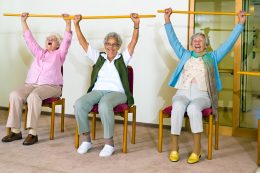Healthy Foods That Are Easy for Seniors to Eat
We all know the importance of eating healthy as children and young adults: to fuel the body properly for growth and aging into a full-grown adult in the best way possible. But healthy eating is not just for the young, healthy eating is for everyone. There are few things that you can do that are beneficial to your health such as eating a healthy diet, regardless of your age. But with age, it can become difficult to eat certain healthy foods that are tough, hard, or otherwise difficult for the elderly to eat. Here are three healthy foods that are easy for seniors to eat to help them get a balanced diet.
Oatmeal
One of the best healthy foods that is easy for seniors to eat is oatmeal. Oatmeal is wonderful because it is flavorful, filling, and easy to chew, since it is soft and mushy. Oatmeal is wonderful because it is full of fiber and whole grains (assuming you are using high quality, healthy oats) that can support digestive health in the elderly, as well as feeding the good gut bacteria in your body. Dress up your oatmeal with a little bit of sliced fresh fruit, yogurt, and some cinnamon for a truly delicious breakfast.
Soup
Another great healthy food that is easy for seniors to eat is soup. Just like oatmeal, soup is wonderful since it requires very little chewing, and what chewing it does require is occupied by soft veggies and meats in the soup. Soup is full of nutritious ingredients that can make a filling meal. For seniors, try to focus on soups that are very smooth, or involve softer chunks, like potatoes, well-cooked veggies, and small, tender meats and fish. A baked potato soup, or chicken noodle are great soups to start for seniors.
Smoothies
And last on our list today, another healthy food that is easy for seniors to eat is smoothies. Smoothies are wonderful because they can take what would normally be difficult foods for seniors, like hard fruits or veggies, and turn them into a smooth and delicious drink. Smoothies that are full of fresh fruits and veggies are incredibly nutritious and are outrageously delicious. Try giving the senior in your life a homemade smoothie for new foods that are easy to eat.
Eating healthy is one of the most important things that you can do for your long-term health. And this is true even for seniors, even though it may be harder for them to eat. Focus on serving your seniors these easy to eat, nutritious meals.
Check out this article to learn how to spot certain health concerns early on!
3 Great Exercises for Seniors with Limited Mobility
Keeping fit is important for senior citizens. However, as you grow older, it’s not unusual for you to develop conditions that limit your mobility and make some exercises painful or difficult. Don’t give up—there are exercises that can accommodate any mobility limitations you may have.
Tai Chi
Tai Chi is great for seniors with limited mobility because it involves slow movements. In doing Tai Chi, you stand mostly in one place, while moving the arms, shoulders, heads, legs, and trunk in deliberate, choreographed movements. It stretches your muscles and joints gently.
The benefits of Tai Chi are numerous. It strengthens the core, leading to improved balance and muscle strength. Good balance helps prevent falls. Tai Chi also lowers blood pressure and improves circulation. It may encourage better sleep and mental health. Just a few minutes of Tai Chi each day can make a difference in your health and fitness.
Swimming
Swimming takes the pressure off your joints and allows you to move more freely. The water in a pool provides gentle resistance, which is part of why swimming is gentle on your joints. Movements that are painful on land are easy to do in the water. At the same time, swimming can give you a good workout and keep your muscles and bones strong.
If mobility limitations make traditional swimming difficult, seniors can also benefit from swim-walking and water aerobics. Swim-walking in the shallow end of a pool gives you aerobic benefits and increases your endurance. A water aerobics class is a fun way to work out all parts of your body.
Chair Yoga
If standing, walking, or balance is difficult, you may benefit from chair yoga. This is typically done in a class, but there are several videos available you can follow along with at home. With chair yoga, you do all exercises while safely seated.
Most chair yoga exercises involve stretching the upper body, focusing on muscle strength and flexibility, as well as deep breathing, although there are also some exercises for the lower body. Like traditional yoga, chair yoga improves circulation, lowers blood pressure, and reduces depression.
As you grow older, mobility limitations don’t mean you have to give up exercising. You can benefit from any type of fitness that involves moving and stretching your body. Many traditional forms of exercise can also be easily adapted to suit your needs.
Check out this article on how seniors can prevent major dental issues!
How Seniors Can Prevent Major Dental Issues
As you age, it can be increasingly difficult to take care of your dental hygiene. Especially since your teeth might lose their strength over time, you might have more and more dental issues as you or your loved ones grow older. Here are a few ways seniors can prevent major dental hygiene issues.
Take Care of Your Oral Hygiene
First off, Millenium Dental says you should have a foundation of good oral hygiene habits. It is important to brush your teeth for a few minutes at least twice a day. It is also important that you floss your teeth daily since food residue can get stuck in between teeth, causing cavities or infections. If you struggle with cavities, using an electric toothbrush or waterpik flosser, which can greatly improve your oral hygiene. Drinking fluoridated water and using fluoride toothpaste can also strengthen your teeth and decrease your oral health issues.
Eat a Healthy Diet
Another great way to prevent major dental issues is to get into the habit of eating a healthy diet. There are certain foods that can strengthen your teeth, and there are certain foods that can cause issues such as cavities and infections. For example, Maccaro Pediatric Dentistry says fibrous fruits and vegetables are great for your teeth. Starchy foods and sugary foods, on the other hand, can cause your teeth to be more susceptible to cavities. Even acidic foods such as oranges or lemons can wear down your teeth over time if eaten very often. By having a balanced diet and tracking what you eat, you can reduce the risk of oral health issues.
Visit the Dentist
Finally, Alexandria Art of Dentistry says it is very important that you and your aging loved ones visit the dentist regularly. Especially since your teeth get more sensitive and worn down as you age, your biannual visits to the dentist become even more important. In these visits, you’ll likely have a routine cleaning and flossing, as well as have some tests done that can detect cavities or infections. If you end up having some issues with your oral hygiene, your dentist will be able to give you the best advice on how to resolve and treat those issues.
As you’re trying to figure out how you can help your loved ones to maintain their oral health, remember the suggestions that have been discussed in this article. Taking the different lifestyle steps to prevent major dental issues can help simplify some of the health issues that happen as you age. Remember to implement these different steps to promote the best dental health possible for yourself and your loved ones.
Read this next: Nutrients Every Senior Needs to Be Healthy
Nutrients Every Senior Needs to Be Healthy
Seniors need to be conscientious of their health. While there are many things that need to be considered, diet and nutrition should be a priority. In order to stay healthy, there are certain nutrients seniors need to make sure are included in their diet.
Calcium and Vitamin D
With age, bones and muscles begin to weaken. Calcium is a key nutrient that can help with bone and muscle strength. As you’re probably aware, calcium is found in most dairy products, but it is family found in milk. However, other sources of calcium include seeds, nuts, lentils, beans, and fish. Choosing from these foods can help provide more variety. In addition to calcium, it’s important to include vitamin D. Vitamin D is essential because it helps your body absorb calcium. It can also be beneficial for improving mood. You can get vitamin D from the sun, but there are also foods, such as milk or juice, that are fortified with vitamin D. Taking a vitamin D supplement is also an option.
Fiber
Fiber can do many wonders for the body. One of the top benefits for seniors is fiber’s ability to lower cholesterol. This can help decrease risk of heart attacks and other related issues. Getting enough fiber in your diet can reduce your chances of developing hemorrhoids and dealing with the symptoms that go with them. Fiber is found in most fruits, vegetables, and grains. Basically, any food that takes a lot of chewing has a good amount of fiber. Specifically, you can make sure to include beans, berries, whole grains, potatoes, etc.
Vitamin B12
Like many other vitamins and nutrients, vitamin B12 has a wide range of benefits. You can see improvements in brain function, muscle and bone strength, mood, and even better hair, nails, and skin. However, vitamin B12 is especially important in red blood cell formation. It helps red blood cells to form properly so they can deliver oxygen and nutrients throughout the body. Keeping up with vitamin B12 is beneficial to seniors because having a well-functioning circulatory system can benefit many other systems in the body.
There are many essential vitamins and nutrients. It’s important for seniors to try and include all of these essential nutrients in order to keep up their health. If it is a challenge to maintain every nutrient, an effort should be made to at least include these nutrients.
Read this next: Important Tips for Safe Senior Swimming Experiences
What Kinds of Specialists Should I Be Seeing?
Most people know that they should be seeing a primary care physician but knowing when to see a specialist can be a little more complicated. There are many types of specialists that each can help with different medical conditions and issues. When you understand the kinds of specialists there are available you can make informed choices about your own healthcare.
Otolaryngologist
While an otolaryngologist may sound like a complicated physician that most people don’t need, they’re actually just ear, nose, and throat doctors. That means that it is important to visit them when you experience problems in any of those three areas. Ear nose and throat conditions can range from being simple to complicated and from minor to serious. It’s important to schedule a visit with your ENT as soon as you notice a problem in any of those areas. The earlier you catch an issue the easier it generally is to resolve it or find a treatment plan.
Gastroenterologist
A gastroenterologist is a doctor that specializes in helping people with problems of the digestive system. From IBS to hemorrhoids, a gastroenterologist treats digestive concerns that you may be experiencing. Digestive problems are very common and it’s important to take care of them as early as possible. Sometimes the diagnosis process can take time, so the earlier you speak to a gastroenterologist the sooner you will learn about your problem and be able to start resolving it. If you are experiencing stomach or intestinal issues, it’s time to reach out to your gastroenterologist.
An Orthopedic Specialist
Mobility is essential to people of all ages and backgrounds, and if you’re having difficulty with your mobility you may want to speak to an orthopedic specialist. Orthopedic specialists focus on bones and joints and helping people to repair them. Sometimes the joint will become damaged due to an injury, and in other cases damage occurs overtime. Your orthopedic specialist can help you to understand the best treatment options for your problem. Sometimes you will need to have surgery to repair a problem while in other cases physical therapy and medication might do the trick.
When you understand the kinds of specialists you have available, you can take control of your health. Everyone has different needs and specialists can help you meet those needs effectively. Learn more about the kinds of specialists there are available you can make sure that your body is well taken care of.
Read this next: What You Can Do to Make Your Senior Loved Ones Less Lonely During Isolation
How to Spot These Health Conditions Early On
There are so many different health conditions that you could develop later on in life that could be prevented or spotted early. Knowing some of the tell-tale signs of these diseases could help you save yourself a lot of time, pain, and money. Know that this list is not comprehensive so be sure to do more research.
Memory Loss
According to Medical News Today, memory loss from Alzheimer’s or dementia can be incredibly scary as an individual gets older. Thankfully, there are things you can do to recognize it and prevent it. Typically, knowing if you have a family history of diseases associated with memory loss can help you know how important it is for you to take preventative steps.
Generally, following a healthy diet, exercising regularly, and getting good sleep are all things you can do in your younger years to prevent your memory from declining as rapidly when you age.
Dental Problems
There are a variety of dental problems like having cavities to having gum disease that can cause you a lot of pain if not prevented or properly treated. Be aware of things like chronic bad breath and painful gums that bleed easily. Additionally, according to Stellar Family Orthodontics, having difficulty cleaning your teeth or regularly biting your cheek could be early warning signs of issues.
There are a variety of things you can do to try and prevent issues from developing. But of the different things, try and make sure you go into your dentist regularly. And even more than that, make sure you brush and floss twice daily.
Arthritis
According to WVU Rheumatology, spotting arthritis early on varies a bit from person to person, but there are some common signs and symptoms that you should be aware of. One of the first symptoms that you should pay attention to is prolonged stiffness when you first wake up.
Having a bit of soreness or stiffness after waking up is normal, but if it lasts for more than a few minutes, you might be experiencing early manifestations of arthritis. Go into the doctor to get looked at because they might be able to prescribe you with treatment to prevent the arthritis from becoming significantly worse.
As you work to be aware of different health conditions you could be susceptible to, make sure you understand your family history. The more you know about the various conditions suffered by family members, the more you will be prepared against conditions passed down genetically. Ultimately, focus on living a healthy life and trust your medical professionals.
Read this next: Three Dental Habits Seniors Should Adopt to Stay Healthy
Important Tips for Safe Senior Swimming Experiences
Swimming increases heart health and overall circulation while remaining an effective aerobic exercise that’s easy on the joints. This makes swimming the perfect exercise for seniors looking for a way to get out and get active, without the dangerous physical strain it can be on frail muscles or bones. Here are a few tips to make sure swimming stays a safe, positive experience for seniors!
Avoid Solo Swims
A good tip for any swimmer is to make sure there is always someone else present in the pool area while you are swimming. Cramping and breathing problems can prove to be fatal if there is not someone else present to help you out of the water and perform or contact proper medical assistance. Even the best swimmers are never immune to the dangers of deep water and muscle spasms, so make sure that you are in a place where you can receive help if necessary!
Make Sure the Water is Safe
Just like air quality is important for any other sport, the water you are immersed in should be equally safe. The bacteria in and acidity of your water don’t just affect the pool surfaces, they affect you as well. Keeping your pool clean and in good condition is part of maintaining a safe swimming environment. Verify that the water is safe and swimmable by checking the pH levels, alkalinity, amount of chlorine, and calcium hardness of your water, as each of these can be dangerous to your skin and eyes, and a lack of any of these can mean the existence of infections in the water that will harm your eyes, nose, and even organs.
Use an Accessible Pool
You will of course want a pool that is as safe in structure as it is chemically. Before you commit to a pool or even enter one, make sure there are easily maneuverable stairs with handrails and traction grip on the pool floor to make getting in and out of the pool easy. Ideally, there will be multiple sets of stairs in a higher-trafficked pool. Make sure as well that the depth of the pool is consistently manageable for your height and endurance. If you are treading water you will need a deeper area to allow for the leg movement, but remain near walls so that you are able to grab on if needed.
Keep yourself or your loved seniors safe with the proper precautions. Never swim alone, and make sure the water and structure of your pool are safe to be in! Enjoy the benefits of swimming with the peace of mind that you are taking care of yourself, and being taken care of.
Read this next: What Are the Benefits of Preventative Health Services?
How to Help Your Parents Continue to Feel Independent
It is a difficult transition for children to take on the role of taking care of their parents. Many may feel like they do not have the time or the resources to properly take care of them. Additionally, the parent may feel embarrassed and frustrated with their inability to completely function on their own. When looking for assisted care for your parents, it is important they still feel a sense of independence. You can help your parents continue to feel independent by involving them in the decision-making process, thoughtfully considering their location, and scheduling visits.
Involve Them in All Decisions
While your parents are unable to safely care for themselves, they are still adults with opinions. Their healthcare priorities may be different than what you perceive. Let them make decisions for themselves and their own care. Taking away their agency will decrease their confidence and feelings of value. While your parents are still capable, let them decide how they are looked after.
Consider Location
When looking for a care facility, it is important to find one that is central to their family, their doctor, and any other places they like to frequent. Your parents need to be able to access these places easily for their physical and mental well-being. This will help them avoid memory lapses and will help you feel confident that they are receiving the proper medical and social care.
Keep a routine to help them familiarize themselves with their new living environment and how they will get to around on their own. It is important for them to be close to their doctor and anyone else they see for appointments and that they know how they are getting to these places.
Schedule Visits
Most parents feel protective and confident when they have their children gathered for dinner. You can help your parents feel similarly independent when you schedule visits either individually or with your children in an environment where they are in control. Let your parents play the role of the host. Even if your parents cannot leave their care facility, visit them often to remind them of their family and give them opportunities to socialize.
Transitioning to a care facility can be a difficult process for you and your parents. Help them maintain their independence by involving them in the decision-making process, considering location, and scheduling visits. This will make the transition much smoother and encouraging.
Do you need help setting up end of life care? We’ve got you covered!
Three Dental Habits Seniors Should Adopt to Stay Healthy
While you may not be focused on it, your dental health is essential in protecting your physical well-being. Proper dental care habits are easy to develop and will save you a lot of financial worry in the future. A healthy mouth can also protect you from disease. Here are some habits you should integrate into your life.
See a Dentist Every Six Months
According to Cigna, visiting the dentist’s office twice a year is a great way to protect yourself from tooth decay. Dentists can give advice that is appropriate for your situation—which is important if you are a senior. They can also schedule appointments for toothaches and root canals if you are in an emergency.
A good dentist will also inform you of cleaning practices and hold you accountable on your personal dental care. Visiting every six months sets an expectation and goal in keeping your teeth clean. If you are still struggling with cavities and you aren’t sure why, a doctor might be able to prescribe you custom toothpaste.
Flossing Regularly
Brushing your teeth every morning and night is essential to excellent dental health. However, if you are only brushing your teeth, you might be missing some important areas of your mouth that need attention. Flossing clears out food and tartar in hard to reach areas (specifically, between the teeth.)
If you do not floss a few times a week, you could be at risk in getting gum diseases like gingivitis. According to Lakeside Dental, infected gums can lead to other oral diseases, which can get expensive. Ideally, you should floss 2-4 times a week.
Eat Less Sugar
Despite what you may think, your eating habits can also drastically affect your chances of getting cavities. Your dentist may ask you questions to understand your diet. They can advise against eating sticky hard-candy and sugary sodas. Listen to their advice and try to apply it.
According to FITNESS:1440, while your sugar intake is a choice you should make, there are other health risks you take if you eat too much of it. Be aware of what you are putting into your body—you never know how much your food decisions will affect your life.
If you want a strong set of pearly whites, you must put in the work for them. Managing your sugar intake and scrubbing your teeth daily are essential. Even though you might find these practices tedious, they will ensure you live longer and happier. Don’t forget to smile!
Do you or a loved one need a little extra help with your senior health? Check out our homecare services!
What Are the Risk Factors That Contribute to Alzheimer’s?
Alzheimer’s disease is a progressive disease that affects memory. It can be very disheartening to see this disease developing in your parents. Make sure you are aware of the risk factors so you can take all necessary measures to protect your parents’ health. Here are just a few of them.
Family History
According to the Alzheimer’s Association, one of the first indicators of a development of Alzheimer’s is family history. An individual is more likely to develop the disease if a parent or sibling also had it. The risk is even higher if more than one family member has Alzheimer’s. Prevalence in a family can be due to both genetic and environmental factors. It’s important to understand how family history can impact the development of Alzheimer’s so you can be adequately prepared.
Loss of Senses
As Alzheimer’s develops, connections in the brain begin to disintegrate. Primarily we think of how this affects memory and other brain functions, but it also impacts how the brain processes the senses. Smell in particular has been a major indicator. Individuals with Alzheimer’s are either confused by what they smell or they lack any sensory recognition. Sight is another major sense impacted by Alzheimer’s. There is no physical damage to the eye, but it becomes difficult for the brain to process certain images. This can be true of shapes, colors, and even faces.
According to Audien Hearing, people with hearing loss are almost twice as likely to develop Alzheimer’s. They might have perfect hearing, but their brain doesn’t process the sounds properly. It can cause confusion and stress. This is why individuals with Alzheimer’s prefer a calm and quiet environment.
Pre-Existing Conditions
According to Aegis, research has shown that Alzheimer’s is common among individuals with heart conditions. The brain is nourished by a network of blood vessels so if your heart is not optimally healthy it can also affect your brain. Some conditions include heart disease, stroke, diabetes, and high blood pressure. Make sure your parents consult with their doctor about monitoring their heart health. It can be helpful to eat a balanced diet, exercise regularly, and reduce stress. Another condition that could create risk is head injuries. Make sure your parents take all precautions such as wearing a seatbelt or “fall proofing” their home. Overall, maintaining a healthy lifestyle can help to address risk factors.
The development of Alzheimer’s disease and dementia can be very difficult on a family. Being aware of risk factors can help you catch the signs early and intervene. Work with your parents on their health in order to lower the risk.
If you need help caring for a parent, let us know! Contact us to schedule an appointment for our home health care services.
















